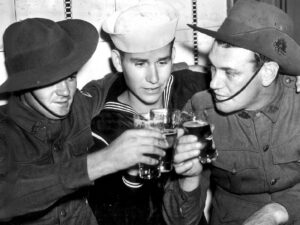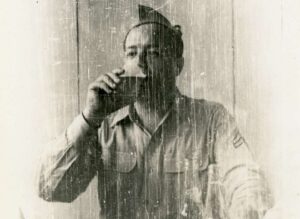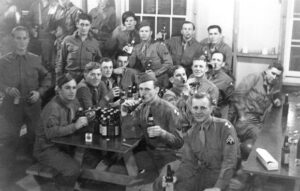Forgotten Friday – Beer in Wartime
‘Beer is Best. It makes for contented workers, friendliness and tolerance, as the Government found in the last war. Above all – beer makes for British cheerfulness, which is undefeated.’ This was the slogan for one of the first advertisements produced by the brewing industry during World War II. However, from the outbreak of war and for the next six years, the British public had to make many compromises when it came to its beer.

AIF Solider drinking beer
Beer droughts were exacerbated by a shortage of drinking glasses and bottles. Bottled beer was often scarcer than draft, so pub-goers often had to wait to pounce on an empty glass and hand it back at the bar. Some licensees refused to serve anyone who did not bring a glass to the bar with them, whilst others would not refill a used one on the grounds that the customer must have had a drink already. The beer, although unrationed, was always running out and when customers finally got a pint, it was watered down.
Whilst the brewing trade was adamant that beer drinkers yielded a lot of money that ultimately contributed to the huge daily costs of war, there were some that believed that packed public houses were a hindrance rather than a help. There were concerns for security, when a brewery advertisement was criticised for encouraging people to ‘talk at ease’ in the pub, at a time in which propaganda posters were urging British citizens not to discuss the strategies of war in public. There were also complaints that a great amount of barley was still being supplied to brewers when pig breeders could not get supplies. Demands were made by the National Temperance Federation to decrease opening hours, restrict the output of liquor, and impose further rules on breweries and drinkers.

beer 2013.221.128_1 – Toni Kiser https://www.nationalww2museum.org/war/articles/how-world-war-ii-saved-american-beer-brewing
Some of these demands had to be implemented regardless as the war continued. Too many drinkers were chasing too few pints as barley was diverted from breweries to bakeries. Alcohol rose sharply in price, more than most other items, and by 1944 the price of a pint had risen from 6d to around 1s.3d. The display of ‘No Beer’ signs on pubs became more common from 1941 onwards and pubs were forced to reduce opening hours, or only open on alternate nights, having to ration their customers to only one pint, or even half a pint, a head. To save transport, each pub was required to get its supplies from within a thirty mile radius, but some pubs tied to particular brands were still kept stocked.
The demand for alcohol increased when US troops were stationed in the UK from 1942. Alcohol was the only commodity in short supply at GI camps, but many Americans found themselves met by glares when entering British pubs. Known for their spending, GIs were often assisted by children bringing them drinking vessels, such as jam jars, in the hopes of earning sweets in return, with the well know phrase ‘Got any gum, chum?’

GI’s Enjoying a brew!
The GIs were warned not to complain about lukewarm and watery beer. An official leaflet given to the GIs advised them upon their arrival on British soil:
‘The British are beer drinkers and can hold it – the beer is now below peace-time strength, but it can still make a man’s tongue wag at both ends. You will be welcome as long as you remember one thing, the pub is the ‘poor man’s club’ where the men come to see friends, not strangers …”
Further advice included: Don’t comment on politics. Don’t tell the British that America won the last war. Never criticise the King and Queen. Don’t criticise food, beer or cigarettes and remember they have been at war since 1939.

